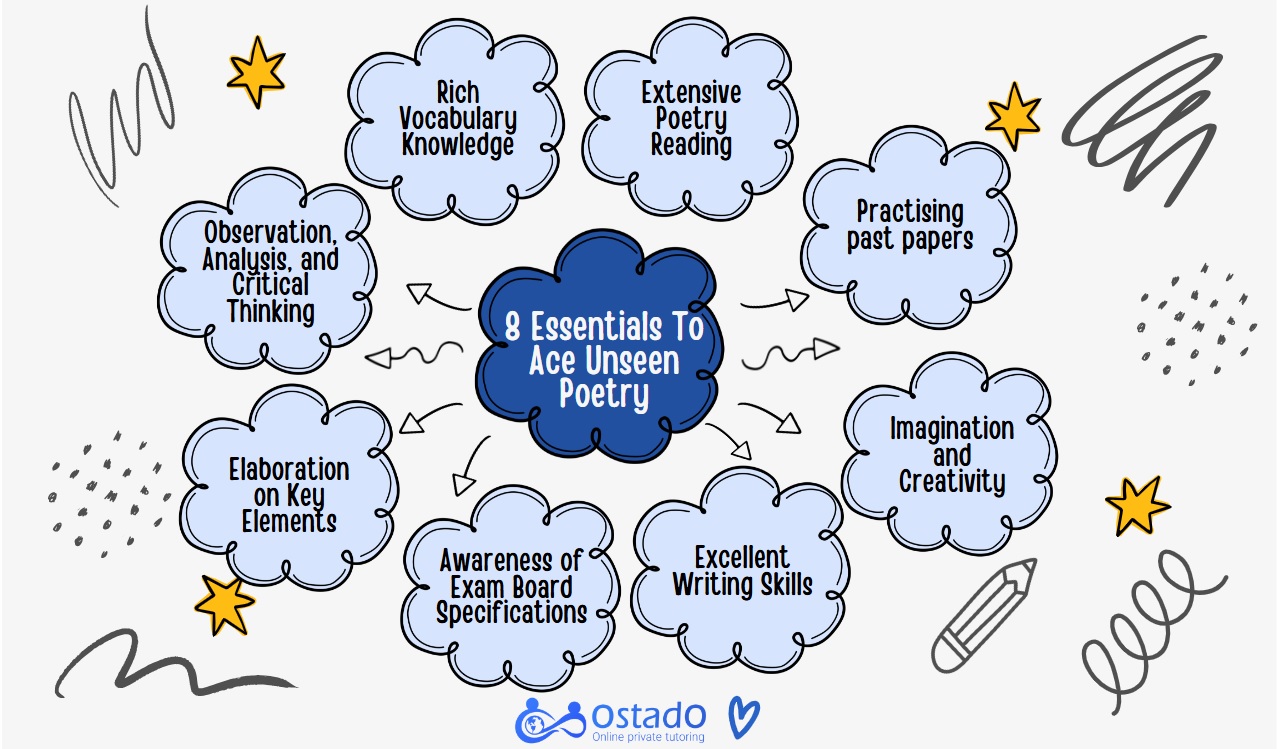Not all surprises are fun, and not all of us like surprises. That’s what makes unseen poetry a bit tough. But when you know what needs to be done, you’ll see that unseen poetry is actually a lot of fun, and you will enjoy yourself when you respond to the task. It’s one of the few occasions where your own ideas actually matter and are rewarded with exam marks; there are some considerations, though.
What to Expect in the Unseen Poetry Section?
There are two unseen poems in the last section of GCSE English Literature Paper 2. You should analyse the first poem and compare it with the second one. The good news is that you’re not expected to know everything—just to explore what you see in the poem.
The analysis of the first poem is more important because it’s worth 24 marks, and comparing the second poem to the first one is worth 8 marks.
Overall, the unseen poetry section is worth 32 marks, and you have 45 minutes to respond to the task. Of course, the marks and the time are based on the AQA exam board, which might be slightly different from other exam boards.
Best Ways to Revise for Unseen Poetry Exam Paper
Although you don’t know what’s awaiting you in the last section of the GCSE English Literature exam, there are some activities you can do to get the highest grade in the unseen poetry section.

1. Read Many Poems
Extensive poetry reading is an unfocused way to revise for GCSE English literature exams. Poetry Foundation offers a vast collection of poems from different styles and eras. You can also read the poem of the day. It helps you familiarise yourself with random poems, which significantly increases your readiness for GCSE English literature paper 2.
You can also study GCSE Unseen Poetry Revision Books to get your hands on a wide range of poems that help you prepare for the exam.
2. Practise Past Papers
Past papers not only familiarise you with the exam format and mark scheme but also give you a sense of what sort of poems you’ll face in the GCSE paper two literature exam. You can access and download past papers from different exam boards here.
Practice answering the questions under a time limit to develop time management skills as well. It will also help you cope better with the stress of time restraints.
In addition to past papers, there are other GCSE poetry resources and unseen poetry GCSE examples that can maximise your preparedness for the exam and improve your grades. You should start revising early to be able to cover these resources.
Get Help From a Tutor
Responding to unseen poetry tasks can be tricky due to the delicacies of poetic language. With the help of Literature GCSE tutors, you can make better use of your time, explore more poems and appreciate the beauty of poetry to the fullest.
Ostado‘s tutors can help you revise the poems with rich language to prepare you for what will appear in the GCSE English Literature exams. Book a free session now to check out the quality we promise.
3. Expand Your Vocabulary
It’s very likely to encounter an unfamiliar word in the poem, which is not so problematic unless it’s a keyword. The least you can do to understand the poem’s meaning is to acquire extensive vocabulary knowledge. Limited vocabulary prevents you from having a basic understanding of the meaning, and you might write a whole essay under false presumptions.
Aside from a clear understanding of the poem, having an intensive vocabulary knowledge helps you communicate your thoughts more precisely and efficiently. Click on “Expanding your vocabulary” to learn how to use vocabulary to your advantage.
4. Let Your Mind Float
There are no correct or incorrect answers in the unseen poem section. What matters to the examiners is your ability to “maintain a critical style and develop an informed personal response.” Also, you should be able to support your interpretation with textual references, including quotations. So, your response can be anything so long as it meets the Assessment Objectives (AOs) set by your exam board.
- AQA GCSE English Literature Assessment Objectives
- Edexcel GCSE English Literature Assessment Objectives
- OCR GCSE English Literature Assessment Objectives
- CIE GCSE English Literature Assessment Objectives
Also read: How to revise “A Christmas Carol” GCSE
5. Practise Essay Writing
You have to be both a keen-eyed reader and a skilled writer to get the highest grade in GCSE English literature exams. You can follow these steps to ensure your answer is accurate and adequate.
- Read the question carefully. Read it twice if needed to make sure you understand what’s expected from you.
- Read and annotate the poem. Skim the poem to get its overall mood. Scrutinise the poem in the second reading to discover what elements can help you answer the question. Jot down quick notes to save your thoughts. In the third reading, see if your notes are supported by the poem’s lines.
- Plan your answer. It might be tempting to start writing as soon as you’re done with reading the question. But there is a good chance you’ll get lost midway or find yourself recycling your ideas in different words. It’s worthwhile to plan your answer and know what to do throughout the essay.
- Write a structured answer.
- Start with an introductory paragraph that states the main themes you want to write about.
- Start each body paragraph with a unique topic sentence that supports the thesis statement and is supported by evidence in the poem.
- Summarise and restate your points and explain what the poet ultimately wants to say in the last paragraph.
- Compare/contrast the second poem with the first poem, covering the themes, tones, techniques and language used in the poems.
6. Learn the Exam Board Specifications
GCSE exams administered by different exam boards vary slightly in the arrangement of questions, mark schemes and style. For example, unseen poetry in AQA is in Section C, whereas in Edexcel, it is in Section B. You should know the specifications of your exam board to learn what’s expected of you. It’s worth mentioning that all exam boards must comply with the regulations set by Ofqual, and their syllabi must be in line with the National Curriculum.
- AQA GCSE English Literature Specifications
- Edexcel GCSE English Literature Specifications
- OCR GCSE English Literature Specifications
- CIE GCSE English Literature Specifications
Also read:
The GCSE exam boards should follow the standards of Ofqual, meaning the exams administered by one exam board should not be more complex. However, test takers find exams administered by a particular exam board more complex, which we refer to as perceived difficulty. You can read “The Hardest GCSE Exam Board” to find out which exams are famous for difficult exams and in which subjects.
7. Prepare for Surprises
The poems in the unseen section can be written by any poet from any period and in any form. That is, there is an equal chance to face a Shakespearean sonnet or free verse by Carol Ann Duffy.
Unfortunately, there is no way to know what the next unseen poems will be on any exam board. And obviously, you can’t read all the poems. But hopefully, by observing the above revision guidelines, you won’t be shocked by what you’ll see on the exam paper. Consider it an exciting and impactful challenge.
Pro tip:
Manage your time in such a way that you have enough time to review and proofread your answers. These final retouches are what stands between a good and excellent answer.
8. Avoid Overthinking
It’s true that you should read between the lines when dealing with a literary text to understand its essence. However, remember that poets or authors don’t use literary devices and techniques unless it’s justified.
Therefore, if you want to elaborate on certain elements in the unseen poetry, look for evidence in the poem to support your point. Otherwise, you’ll be surrounded by too many minor details that make it difficult for you to give a coherent response to the task.
How to Respond to Unseen Poetry Section Tasks
You should analyse the first poem from three aspects and compare the second poem with it regarding the same aspects.
1. Language
Try to understand the justification behind the poet’s word choice. Why did he or she choose the words, and how did the words intensify their meaning? When analysing the language, you should look for figures of speech, such as metaphor, simile, alliteration, imagery, symbolism, etc.
2. Form
Form refers to the pattern in which the poet expresses their thoughts. Popular forms include
- Sonnet: a 14-line love song
- Lyrics: short expression of the poet’s emotions and thoughts
- Ballad: a narrative poem with a simple rhyme scheme which recounts tales of adventure, romance, and tragedy.
- Epic: a long narrative poem which tells the tales of historical or legendary figures and their heroic actions.
3. Structure
Structure refers to how the stanzas and lines are organised in the poem. When analysing the structure of the poem, you should pay attention to the shape of the poem, the number of stanzas and lines and the length of stanzas and lines. Popular structures are couplets (2 lines), trecets (3 lines) and quatrains (4 lines).
FAQs - Unseen Poetry Revision

